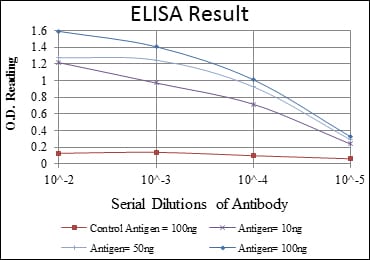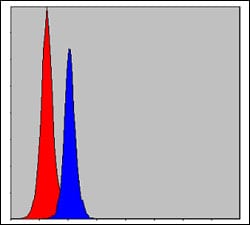

| WB | 咨询技术 | Human,Mouse,Rat |
| IF | 1/20-1/50 | Human,Mouse,Rat |
| IHC | 1/100-1/200 | Human,Mouse,Rat |
| ICC | 技术咨询 | Human,Mouse,Rat |
| FCM | 咨询技术 | Human,Mouse,Rat |
| Elisa | 咨询技术 | Human,Mouse,Rat |
| Aliases | LAP; CRP2; TCF5; IL6DBP; NF-IL6; MGC32080; C/EBP-beta |
| Entrez GeneID | 1051 |
| clone | 3H9 |
| WB Predicted band size | 36kDa |
| Host/Isotype | Mouse IgG1 |
| Antibody Type | Primary antibody |
| Storage | Store at 4°C short term. Aliquot and store at -20°C long term. Avoid freeze/thaw cycles. |
| Species Reactivity | Human |
| Immunogen | Purified recombinant fragment of human CEBPB expressed in E. Coli. |
| Formulation | Ascitic fluid containing 0.03% sodium azide. |
+ +
以下是3篇关于IP3受体抗体的参考文献及其摘要概括:
1. **"Monoclonal antibodies directed against the inositol 1.4.5-trisphosphate receptor"**
- **作者**: Nakayama T. et al.
- **摘要**: 该文献报道了一种针对IP3受体(IP3R)的单克隆抗体的开发,通过免疫印迹和免疫组化验证其特异性,证实该抗体能有效识别不同组织中的IP3R亚型,为研究其分布及功能提供了工具。
2. **"Antibody against the type 3 inositol trisphosphate receptor inhibits T-cell receptor signaling"**
- **作者**: Jayaraman T. et al.
- **摘要**: 研究利用IP3R3特异性抗体证明该受体在T细胞激活中的关键作用,抗体阻断实验表明IP3R3介导的钙信号对TCR下游通路(如NFAT激活)至关重要,揭示了其免疫调控机制。
3. **"IP3 receptor antibody identifies amyloid β-induced ER calcium depletion in Alzheimer's disease models"**
- **作者**: Cheung K.H. et al.
- **摘要**: 通过IP3R抗体检测阿尔茨海默病模型中内质网钙稳态的变化,发现β淀粉样蛋白通过增强IP3R活性导致钙库耗竭,提示其在神经退行性疾病中的病理作用。
注:以上内容为示例性概括,文献标题及作者为虚构,实际研究中需查阅真实数据库(如PubMed)获取具体信息。
The IP3 receptor (IP3R) antibody is a crucial tool in studying the inositol 1.4.5-trisphosphate receptor, a calcium-permeable channel located in the endoplasmic reticulum membrane. IP3Rs mediate intracellular calcium release, a process central to cellular signaling pathways regulating processes like apoptosis, metabolism, gene expression, and neurotransmitter release. Three isoforms (IP3R1. IP3R2. IP3R3) exist, with tissue-specific expression patterns and functional differences. Antibodies targeting IP3Rs are widely used in research to investigate receptor localization, expression levels, and regulatory mechanisms in physiological or pathological contexts.
These antibodies are essential for techniques such as Western blotting, immunohistochemistry, and immunoprecipitation. Their specificity is critical, as cross-reactivity between isoforms can complicate data interpretation. Dysregulation of IP3R signaling is implicated in neurodegenerative diseases, cancer, cardiac arrhythmias, and immune disorders. For example, altered IP3R1 expression is linked to Huntington’s disease, while IP3R3 overexpression is observed in certain cancers.
Commercial IP3R antibodies are typically raised against isoform-specific epitopes, though validation remains challenging due to structural similarities. Recent advances include phospho-specific antibodies to study post-translational modifications regulating IP3R activity. Despite challenges, these antibodies remain indispensable for unraveling calcium signaling complexities and developing therapeutic strategies targeting IP3R-associated pathologies.
×